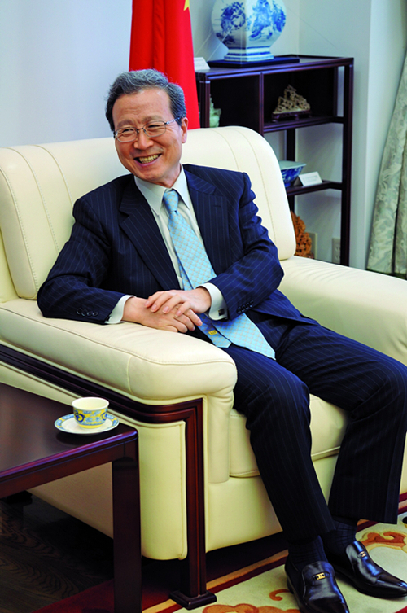WWII's 70th anniversary opportunity for Japan
- By Cheng Yonghua
 0 Comment(s)
0 Comment(s) Print
Print E-mail China.org.cn, August 15, 2015
E-mail China.org.cn, August 15, 2015
|
|
|
Cheng Yonghua, Chinese ambassador to Japan [Photo by Wu Wenqin] |
This year marks the 70th anniversary of victory in the Chinese People's War of Resistance Against Japanese Aggression, as well as the World Anti-Fascist War. It is a time to consider the future of Sino-Japanese relations. What expectation does China have towards Japan? Cheng Yonghua, Chinese ambassador to Japan, shared his view during an exclusive interview with the Japanese language magazine People's China.
People's China: In the past half-year, Japanese politicians have talked much about Japan's standpoint on a range of historical issues as we approach the 70th anniversary of the end of the war, attracting great attention from its neighbors. Why does China pay such close attention to this? How can we balance the relation between the past history and the future? What's your comment on the "Murayama Statement" and the "Kono Statement?"
Cheng Yonghua: The reason that historical issues between China and Japan could not be solved is that there are Japanese leaders and political forces who always attempt to beautify or even deny Japan's aggression in China and other Asian countries. Their provocative actions on sensitive issues, including political visits to the Yasukuni Shrine, comfort women and coverage of aggression in history textbooks, have not only hurt the feelings of many victims throughout Asia, but also raised doubts over the real attitude and sincerity of the Japanese government.
On the occasion of the 70th anniversary of the victory of the Chinese People's War of Resistance Against Japanese Aggression, Japanese politicians' behavior not only determines the long-term development of Sino-Japan relations, but also reflects Japan's development trend in future.
In terms of Sino-Japanese relations, China always holds fast to the spirit of "taking history as a mirror, and looking forward to the future." Recently, President Xi Jinping said at a China-Japan friendship exchange meeting that the purpose of remembering history is not to prolong hatred, but to promote peace and look to the future.
Japan should earnestly face up to and profoundly reflect on its aggressive history, and distance itself from militarism, so as to release the historical burden and pave the way for the smooth development of ties with its neighbors.
On August 15, 1995, then Prime Minister Tomiichi Murayama delivered the well-known "Murayama Statement," in which he apologized for the damage and suffering caused by Japan. On August 4, 1993, then Japanese Chief Cabinet Secretary Yohei Kono released the "Kono Statement," in which he acknowledged that the Japanese Imperial Army had forced women, known as comfort women, to work in military-run brothels during World War II.
These two statements present Japan's attitude and promise and therefore have exerted positive effects to improve relations with its neighbors. We hope the Japanese government can take victims' concerns seriously, listen to the voices calling for justice from the international community and even the Japanese people, keep to the promise of profoundly reflecting upon its aggressive history, and show its sincere apology and sincerity towards the victims, in order to gain trust from its neighbors in Asia and the entire world.







Go to Forum >>0 Comment(s)